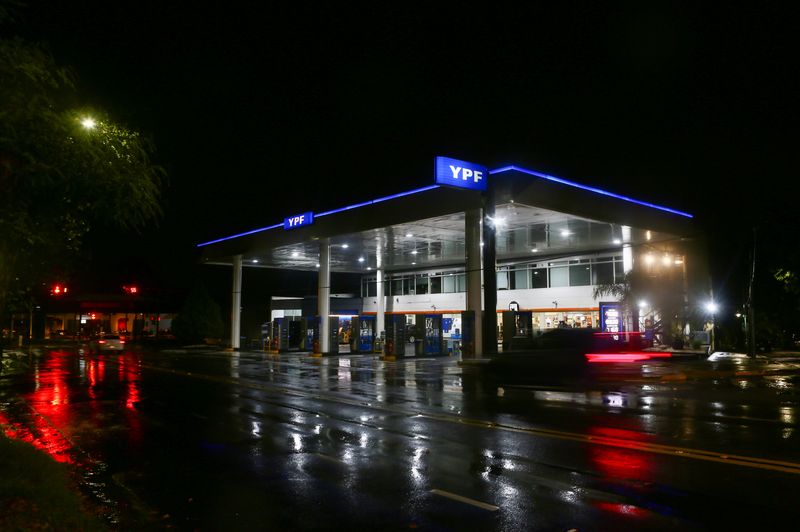By Jonathan Stempel and Nate Raymond
NEW YORK (Reuters) -Argentina suffered a big legal defeat on Friday as a U.S. judge ruled that the country must pay about $16 billion to minority shareholders of YPF arising from the government's 2012 seizure of a majority stake in the oil and gas company.
U.S. District Judge Loretta Preska in Manhattan ruled in favor of Burford Capital, which funded the litigation brought by shareholders Petersen Energia Inversora and Eton Park Capital Management LP, and according to court papers was entitled to a respective 70% and 75% of their damages.
The payout includes the approximately $8.4 billion of damages Burford sought plus about $7.6 billion of 8% prejudgment interest running from May 3, 2012, about 2-1/2 weeks after the seizure.
Argentina, which is in dire financial straits including a scarcity of foreign exchange reserves, pledged an immediate appeal.
Burford called the decision "a complete win." Its shares closed up 22% in London and 14.7% in New York.
Analysts at Jefferies estimated that Burford might be entitled to $6.3 billion from the verdict.
Argentina had sought to pay no more than $4.92 billion, saying a big payout "would further burden a sovereign nation with a populace enduring pressing economic challenges and would far exceed Argentina's budget for many critical services."
Preska had previously ruled that Argentina had breached its obligations to the shareholders by seizing the 51% YPF stake held by Repsol (OTC:REPYY) without tendering for the remaining shares, including those held by Petersen and Eton Park.
Axel Kicillof, now governor of the Buenos Aires province, said in 2012 when he spearheaded the YPF nationalization that only "morons" would think that the state was stupid enough to play by Repsol's rules and offer to buy 100% of its shares.
Argentina government spokeswoman Gabriela Cerruti posted on X, formerly Twitter, that the country would appeal Preska's decision immediately.
"We will continue to defend energy sovereignty and our state company YPF against vulture funds," Cerruti said.
CASH CRUNCH
Argentina is short of dollars, with its net foreign exchange reserves in the red last month before accounting for a $7.5 billion disbursement from the International Monetary Fund.
It also relied last month on a $775 million loan from Qatar, a $1 billion loan from a regional development bank and $1.7 billion from a swap with China to make a midyear payment to the IMF.
To keep the IMF program in place and money flowing in, Argentina pledged to add reserves, which the IMF estimates could increase by some $8 billion between August and December.
Shareholders' $8.43 billion damages estimate was based on Argentina's seizure of the YPF shares on April 16, 2012, which they said transferred "control."
Argentina countered that the trigger date was May 7, 2012, when the law allowed it to exercise rights attached to the seized shares, and the interest rate should be zero or at most 3%.
But the judge found it "telling" that Argentine officials treated April 16 as the seizure date, which stripped Repsol of its power to run YPF and distribute capital.

She also noted that YPF's share price plummeted by more than 40% shortly after the seizure, reflecting the reality that Argentina was by then "exercising control of Repsol's shares in every meaningful way."
The judge also called 8% interest "appropriate and equitable," and "well within the range" imposed by Argentine courts.